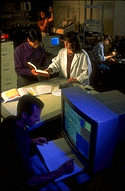As part of the regular process of accreditation, the University is involved in a two-year study of all of the University's practices, both academic and administrative. This study will lead eventually to publication of the University's second long-range academic plan. As did the first long-range plan, this one will generate specific reforms to boost productivity and reduce costs. Teaching and learning are central issues in this project.
 The University has already taken several steps in this regard. It has increased resources for the teaching of undergraduates. Graduate enrollments have been trimmed back and faculty redeployed to undergraduate programs. Aca demic leaders have initiated a number of projects to promote balance between teaching and scholarship. For instance, regulations for the Academic Enhancement Program grants emphasize "research programs that have a direct and visible classroom instructional component." The goal is to ensure that effective teaching is a regular and predictable prod uct of faculty learning and that it is recognized as a key part of the University's mission to create, preserve, and disseminate knowledge.
The University has already taken several steps in this regard. It has increased resources for the teaching of undergraduates. Graduate enrollments have been trimmed back and faculty redeployed to undergraduate programs. Aca demic leaders have initiated a number of projects to promote balance between teaching and scholarship. For instance, regulations for the Academic Enhancement Program grants emphasize "research programs that have a direct and visible classroom instructional component." The goal is to ensure that effective teaching is a regular and predictable prod uct of faculty learning and that it is recognized as a key part of the University's mission to create, preserve, and disseminate knowledge.
The creation of knowledge is a joint enterprise at the University of Virginia. Faculty routinely involve students in their research. Here, associate professor of chemical engineering Roseanne Ford works with undergraduates and graduate students.
The University has also made a concerted effort to expand academic options to students. As part of this reexamination of the curriculum, faculty members are revising requirements for majors, coordinating course content more carefully, and encouraging students to enroll in classes outside their major field of study.
The architecture school has added courses in environmental sustain ability and now permits students to fulfill some requirements in other schools of the University. The nursing school is working with the educa tion school to encourage students to enroll in its infant development program. And the English department is revising its literary history
survey, expanding it to a three-semester sequence, and enlarging its scope to include American and other world literature written in English.
Perhaps the most thorough curriculum reform is underway in the law school, where faculty combine traditional materials with insights gleaned from actual practice. Top-flight practicing lawyers and judges teach for one or two semesters with a professor or team of professors. "The field of law is changing so rapidly and becoming so highly specialized," says law school dean Robert E. Scott, "that today's students have had less opportunity to become familiar with some of the practical, everyday matters they will face on the job."
Rewarding our best
Articulate and inspired teaching is as critical to preparing students for the rigors of the twenty -first century as it was in preparing early generations of students for the demands of the nine teenth. The 1994-95 Alumni Association Distinguished Professor Award went to John C. Jeffries, Jr., the Emerson Spies Professor of Law, and Joseph F. Kett, professor of history. The award is given to a faculty member who has excelled as a teacher, shown unusual concern for students, and made significant contributions to the life of the University over at least a decade. Also honored this year were Patricia Meyer Spacks, the Edgar F. Shannon Professor and chair of the English Department, and Robert F. Bruner, professor of business administration, who received this year's 1995 Outstanding Faculty Award from the State Council of Higher Education.
